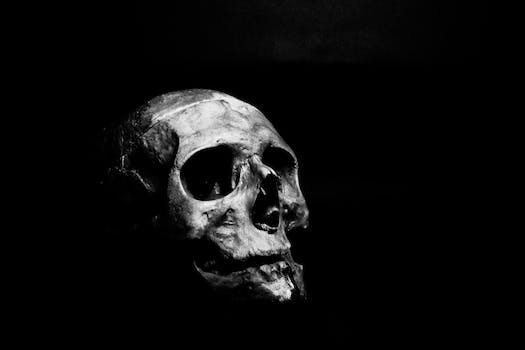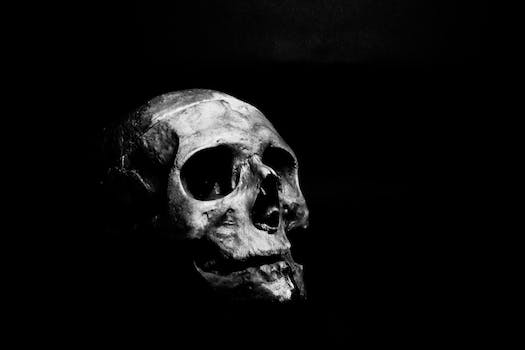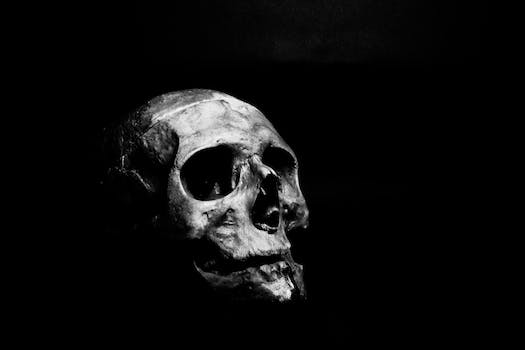Horror is a genre that has captivated audiences for decades. From spine-chilling novels to bone-rattling films, the allure of horror lies in its ability to evoke intense emotions and leave a lasting impression. But why is horror good? This article delves into the psychological and entertainment aspects of horror, exploring the reasons why many people find pleasure and excitement in being scared.
- 1. 1. The Thrill of Fear
- 1.1. Adrenaline Rush
- 1.2. Psychological Excitement
- 1.3. Sense of Danger
- 1.4. Challenge to Overcome Fear
- 1.5. Cathartic Release
- 2. 2. Exploration of Human Psychology
- 2.1. Unveiling Dark Desires
- 2.2. Examining Human Vulnerabilities
- 2.3. Understanding the Human Mind
- 2.4. Exploring Taboos
- 2.5. Reflection on Our Own Fears
- 3. 3. Cultural and Historical Significance
1. 1. The Thrill of Fear
Horror movies and stories have a unique ability to tap into our deepest fears and provide us with a thrilling experience. The feeling of fear, although uncomfortable, can be quite exhilarating. When we watch a horror movie or read a scary story, our hearts race, our senses become heightened, and adrenaline courses through our veins. This rush of emotions can be addictive, and many people seek out horror for the thrill it provides.
The thrill of fear is a primal instinct that has been with us since the beginning of human existence. It is a survival mechanism that prepares us to fight or flee in dangerous situations. While our modern lives may not involve life-or-death encounters on a daily basis, our brains still crave that adrenaline rush. Horror movies allow us to experience fear in a controlled environment, where we know that the threats are not real. This sense of safety allows us to explore our fears and push our limits without actual danger.
Furthermore, horror can be cathartic. It allows us to confront our own fears and anxieties in a controlled setting. By experiencing fear through movies or stories, we can process and release our own pent-up emotions. It can be a form of psychological release, providing a sense of relief and empowerment once the fear is overcome.
In addition, horror can also be a way to explore and understand the darker aspects of human nature. It delves into the depths of human psyche, showcasing our deepest fears, desires, and vulnerabilities. By confronting these aspects in a fictional context, we can gain insights into ourselves and the world around us.
Overall, the thrill of fear in horror is a complex and fascinating phenomenon. It captivates us, challenges us, and provides a unique form of entertainment. Whether we seek the adrenaline rush, the cathartic release, or the exploration of human nature, horror offers us a compelling and thrilling experience that keeps us coming back for more.
1.1. Adrenaline Rush
The adrenaline rush is one of the key reasons why horror is good. It is the thrill of fear that captivates us and keeps us coming back for more. When we watch a horror movie or read a horror novel, our bodies react by releasing adrenaline, a hormone that prepares us for fight or flight. This surge of adrenaline creates a heightened sense of awareness and excitement, making us feel alive and exhilarated. It’s a thrilling experience that allows us to temporarily escape the monotony of everyday life and tap into our primal instincts. The adrenaline rush is addictive, and many horror enthusiasts seek out increasingly intense experiences to satisfy their craving for that heart-pounding thrill. So, if you’ve ever wondered why people enjoy being scared, it’s because the adrenaline rush that comes with it can be incredibly exhilarating.
1.2. Psychological Excitement
Psychological Excitement – The Thrill of Fear
1.3. Sense of Danger
The sense of danger is a fundamental aspect of the human experience. It is an instinctual response that triggers our fight or flight mechanism, keeping us alert and ready to respond to potential threats. In the context of horror, this sense of danger is heightened to its maximum intensity. Horror movies, books, and games often immerse us in a world where danger lurks around every corner. The thrill of fear that comes from experiencing this heightened sense of danger is a key reason why horror is so popular. It provides an adrenaline rush that can be both terrifying and exhilarating at the same time. The sense of danger in horror also allows us to confront our fears in a controlled environment, helping us to better understand and cope with them in real life. It serves as a cathartic release, providing a temporary escape from the stresses and anxieties of our everyday lives. Overall, the sense of danger in horror is what makes it such a compelling and captivating genre.
1.4. Challenge to Overcome Fear
Fear is a primal emotion that has intrigued and captivated humans since the beginning of time. It is a feeling that can consume us, but it can also be exhilarating. This is where the thrill of fear comes into play. For some people, the adrenaline rush that comes from being scared is addictive. It is a challenge that they willingly embrace, seeking out horror in various forms, whether it be through movies, books, or haunted attractions. The thrill of fear offers a unique experience that allows individuals to confront their deepest anxieties and push themselves to their limits. It provides an opportunity for personal growth and self-discovery, as facing and overcoming fear can be empowering. The thrill of fear is what makes horror so appealing to many people, as it provides an escape from the mundane and allows them to experience a heightened sense of excitement and intensity. It is a challenge that can be both terrifying and invigorating, pushing individuals to confront their fears head-on and come out stronger on the other side.
1.5. Cathartic Release
Cathartic Release
Horror movies have long been praised for their ability to provide a cathartic release for viewers. This genre allows people to experience a range of emotions, including fear, anxiety, and suspense, in a safe and controlled environment. By immersing themselves in a terrifying storyline, individuals can temporarily escape from their own worries and anxieties. The adrenaline rush and sense of relief that comes after a suspenseful scene or a jump scare can be incredibly satisfying.
Additionally, horror movies often explore deep-rooted fears and taboos, allowing viewers to confront and process their own inner demons. The intense emotions elicited by these films can serve as a form of psychological release, helping people to cope with their own fears and anxieties in a symbolic way. In this sense, horror movies can be seen as a therapeutic tool, providing a platform for emotional catharsis.
Furthermore, horror movies often offer a commentary on societal issues and fears. They can serve as a reflection of the collective anxieties of a particular era, addressing themes such as corruption, violence, or the unknown. By confronting these issues through the lens of horror, audiences are prompted to contemplate and discuss deeper societal concerns.
In conclusion, the cathartic release provided by horror movies is a significant reason why this genre is considered good. Through the experience of fear and the subsequent emotional release, viewers can find temporary respite from their own worries and anxieties. Moreover, horror movies can help individuals confront and process their inner fears, offering a therapeutic outlet. Additionally, these films often serve as a commentary on societal issues, promoting discussion and contemplation. Overall, horror movies offer a unique and valuable experience that goes beyond simple entertainment.
2. 2. Exploration of Human Psychology
Human psychology plays a significant role in our fascination with horror. The genre taps into our deepest fears and anxieties, allowing us to confront and process them in a safe and controlled environment. It provides an adrenaline rush and a sense of excitement, triggering the release of dopamine in our brains.
One aspect of human psychology that horror explores is the fight-or-flight response. When faced with a terrifying situation, our bodies release adrenaline, preparing us to either confront the threat or run away. Horror movies and stories simulate this response, creating intense and suspenseful situations that keep us on the edge of our seats.
Furthermore, horror allows us to explore our morbid curiosity. It delves into the darker aspects of human nature, such as violence, death, and the supernatural. By engaging with these themes, we can gain a better understanding of ourselves and our fears.
Additionally, horror provides a cathartic experience. It allows us to experience fear in a controlled setting, providing a sense of relief and satisfaction when the threat is resolved. This release of tension can be both exciting and therapeutic, helping us cope with our own anxieties and fears in real life.
In conclusion, the exploration of human psychology in horror is one of the reasons why the genre is so appealing. It allows us to confront our fears, experience intense emotions, and gain insights into the darker aspects of our own nature. Whether it’s through the adrenaline rush, the exploration of our fight-or-flight response, or the cathartic release of tension, horror offers a unique and captivating experience for those brave enough to delve into its depths.
2.1. Unveiling Dark Desires
Exploration of Human Psychology
Horror has long been a genre that delves deep into the intricate workings of the human mind. It is a platform that allows us to explore the darker aspects of our desires and fears, unveiling the hidden depths of our psyche. Through the medium of horror, we are able to confront and examine our deepest, darkest desires in a controlled and safe environment.
One of the primary reasons why horror is so intriguing and captivating to many individuals is its ability to tap into our primal instincts and evoke intense emotions. It forces us to confront our fears head-on, allowing us to experience a rush of adrenaline and a sense of exhilaration. This adrenaline rush can be addictive, as it provides a temporary escape from the mundane realities of everyday life.
Moreover, horror movies and literature often explore themes such as the duality of human nature, the fear of the unknown, and the boundaries of morality. By confronting these themes, we are forced to question our own beliefs and values, leading to a deeper understanding of ourselves and the world around us.
In addition, the exploration of human psychology in horror allows us to examine our own fears and vulnerabilities. It brings to light the aspects of ourselves that we may not be aware of or are too afraid to acknowledge. Through the identification with characters in horror stories, we are able to empathize with their struggles and confront our own inner demons.
Ultimately, the exploration of human psychology in horror serves as a cathartic experience, providing a release for pent-up emotions and anxieties. It allows us to face our fears in a controlled environment and emerge stronger and more self-aware. By delving into the depths of our dark desires, horror helps us navigate the complexities of the human mind and offers a unique perspective on the human experience.
2.2. Examining Human Vulnerabilities
When it comes to understanding the appeal of horror, it is crucial to examine the vulnerabilities that make us human. Human vulnerabilities play a significant role in our fascination with horror as a genre. Whether it is the fear of the unknown, the fear of death, or the fear of losing control, horror taps into our deepest anxieties and exploits them for entertainment purposes.
Exploring human psychology provides valuable insights into why horror is so good at evoking strong emotions and captivating audiences. Our inherent curiosity about the dark corners of the human mind drives us to seek out experiences that push our boundaries and challenge our fears. Horror films, literature, and other forms of media allow us to confront our deepest fears in a controlled environment, offering a sense of thrill and catharsis.
Furthermore, horror often serves as a mirror to our own inner demons and societal fears. It reflects the anxieties and uncertainties of the times we live in, providing a cathartic outlet for processing these emotions. By exploring the darker aspects of human nature, horror allows us to confront our own vulnerabilities and gain a better understanding of ourselves.
In conclusion, the examination of human vulnerabilities and the exploration of human psychology are essential in understanding why horror is so appealing. By tapping into our deepest fears and anxieties, horror provides a unique form of entertainment that allows us to confront and overcome our own vulnerabilities.
2.3. Understanding the Human Mind
Understanding the Human Mind
Exploration of Human Psychology
2.4. Exploring Taboos
Exploring Taboos
Taboos are societal norms or beliefs that are considered forbidden or prohibited. These taboos can vary greatly across different cultures and societies. Exploring taboos in the context of horror allows us to delve into the darker aspects of human nature and confront our deepest fears.
Horror has long been a genre that pushes boundaries and challenges societal norms. It delves into the forbidden and the taboo, addressing topics that are often considered too uncomfortable or unsettling to discuss openly. By exploring these taboos, horror allows us to confront our fears and anxieties in a controlled environment.
Through the exploration of taboos, horror films and literature provide a cathartic release for audiences. They allow us to experience fear and anxiety in a safe and controlled setting, providing an outlet for our darkest emotions. In this way, horror can be seen as a form of therapy, allowing us to confront and process our deepest fears.
Additionally, exploring taboos in horror can also serve as a reflection of society’s fears and anxieties. By addressing societal taboos, horror exposes the underlying fears and concerns of a particular time or culture. It acts as a mirror, reflecting the collective psyche and providing insight into the human condition.
In conclusion, the exploration of taboos in horror is a fascinating aspect of the genre. It allows us to confront our fears, provides a cathartic release, and serves as a reflection of societal fears and anxieties. By pushing the boundaries of what is considered acceptable, horror opens up a unique space for exploring the depths of human psychology.
2.5. Reflection on Our Own Fears
Fear is a universal emotion that all human beings experience at some point in their lives. It is a powerful and instinctual response that is deeply ingrained in our psychology. While fear is often associated with negative connotations, there is something intriguing and captivating about the experience of being scared. This is where the genre of horror comes into play, as it allows us to explore our own fears in a controlled and safe environment.
When we engage with horror, whether through films, books, or other forms of media, we are willingly subjecting ourselves to fear-inducing stimuli. This may seem counterintuitive, but it is through this exposure that we can gain insights into our own psyche. Horror acts as a mirror, reflecting our deepest fears and anxieties back at us.
By confronting our fears in a fictional setting, we are able to process and make sense of them in a way that feels safe. It allows us to explore the darkest corners of our minds without actually putting ourselves in real danger. This exploration of our own fears can be both cathartic and empowering.
Furthermore, horror provides a unique opportunity to examine the complexity of human psychology. It delves into the depths of our minds, unraveling the intricate workings of our fears and desires. The genre often explores themes such as the fear of the unknown, the fear of death, and the fear of the supernatural. Through these explorations, we gain a better understanding of ourselves and the human condition.
In conclusion, horror serves as a platform for reflection on our own fears. It allows us to confront and explore our deepest anxieties in a controlled environment. By engaging with the genre, we gain valuable insights into our psychology and the complexity of human emotions. So, the next time you find yourself captivated by a horror movie or a chilling book, remember that it is not just about seeking thrills, but also about understanding ourselves better.
3. 3. Cultural and Historical Significance
Horror has a deep cultural and historical significance that cannot be overlooked. Throughout history, humans have always been fascinated by the dark and mysterious aspects of life. Horror stories, folklore, and legends have been passed down from generation to generation, reflecting our innate curiosity about the unknown.
Culturally, horror serves as a reflection of societal fears and anxieties. It provides a safe space for individuals to confront their deepest fears and explore the darker sides of human nature. By delving into the realm of horror, we are able to gain a better understanding of ourselves and the world around us.
Moreover, horror has played a significant role in shaping our history. From ancient myths and folklore to classic literature and modern cinema, horror has been a powerful tool for storytelling. It has allowed us to explore themes of morality, mortality, and the human condition in a captivating and thought-provoking way.
In addition, horror has often been used as a vehicle for social commentary. Through terrifying narratives, horror writers and filmmakers have addressed pressing issues of their time, challenging societal norms and provoking discussions. By examining the cultural and historical significance of horror, we can gain insights into the fears, hopes, and values of different eras.
Overall, the cultural and historical significance of horror cannot be underestimated. It serves as a means of entertainment, self-reflection, and storytelling. By immersing ourselves in the world of horror, we can explore the depths of human emotions and gain a deeper appreciation for the complexities of our existence.
3.1. Folklore and Mythology
Folklore and Mythology have a deep cultural and historical significance when it comes to the horror genre. These age-old tales and legends have been passed down through generations, shaping the beliefs, fears, and imaginations of societies across the world. They provide a rich source of inspiration for horror stories, as they often explore supernatural entities, mysterious curses, and the darker side of human nature.
In many cultures, folklore and mythology serve as cautionary tales, warning individuals about the consequences of certain actions or behaviors. They often feature supernatural creatures like vampires, werewolves, and ghosts, representing societal fears and anxieties. These mythical beings embody the unknown, the mysterious, and the terrifying, making them perfect elements for horror storytelling.
Moreover, folklore and mythology offer a glimpse into the past, reflecting the values, traditions, and historical events of a particular culture. They provide a connection to our ancestors and their beliefs, allowing us to explore the roots of our collective fears. By delving into these ancient tales, horror writers can tap into a universal sense of dread and tap into the primal fears that have haunted humanity for centuries.
In conclusion, folklore and mythology play a crucial role in the cultural and historical significance of the horror genre. They provide a wealth of inspiration, offering a treasure trove of supernatural creatures, cautionary tales, and a connection to our ancestral fears. By incorporating elements of folklore and mythology into horror storytelling, writers can create narratives that resonate with audiences on a deep and primal level.
3.2. Preserving Cultural Heritage
Preserving cultural heritage is of utmost importance as it allows us to maintain a connection with our past and understand the cultural and historical significance of certain traditions, artifacts, and practices. Cultural heritage encompasses a wide range of aspects including language, customs, beliefs, rituals, architecture, and artifacts. These elements not only showcase the creativity and ingenuity of our ancestors but also provide valuable insights into their way of life.
The preservation of cultural heritage is essential for several reasons. Firstly, it helps us develop a sense of identity and belonging. By understanding and appreciating our cultural heritage, we can form a deeper connection with our roots and feel a sense of pride in our heritage. It allows us to pass on our traditions and values to future generations, ensuring that our cultural identity remains intact.
Furthermore, cultural and historical significance plays a crucial role in promoting tourism and economic development. Many cultural sites, monuments, and artifacts attract tourists from all over the world, contributing to the local economy. Preserving these cultural treasures not only safeguards our history but also boosts tourism, creating job opportunities and generating revenue.
Moreover, cultural heritage serves as a source of inspiration and creativity. Artists, writers, and filmmakers often draw inspiration from historical events, traditions, and cultural practices. By preserving our cultural heritage, we provide a rich source of inspiration for future generations, enabling them to create meaningful works of art that reflect our cultural diversity.
In conclusion, preserving cultural heritage is vital for maintaining our connection with the past, fostering a sense of identity, promoting tourism, and inspiring creativity. By valuing and protecting our cultural and historical significance, we ensure that our heritage continues to thrive and enrich the lives of generations to come.
3.4. Reflecting Societal Fears
Horror movies have always been a reflection of societal fears, serving as a medium to explore and confront our deepest anxieties. These films tap into the collective consciousness and often mirror the cultural and historical significance of the time in which they are made.
One of the reasons why horror is good is its ability to capture and amplify societal fears. Throughout history, horror has evolved to encapsulate the fears and concerns of each era. In the 1950s, during the Cold War era, movies like ‘Invasion of the Body Snatchers’ reflected the fear of communist infiltration and the loss of individual identity. Similarly, in the 1980s, with the rise of AIDS and other health crises, horror films like ‘The Fly’ and ‘Nightmare on Elm Street’ explored the fear of contagion and the fragility of human existence.
Horror also holds cultural significance by delving into societal taboos, challenging norms, and providing a platform for marginalized voices. It allows us to confront forbidden topics, such as sexuality, religion, and the dark side of human nature. For example, films like ‘Get Out’ and ‘The Babadook’ tackle issues of racism and mental health, respectively, in a way that sparks conversation and empathy.
Furthermore, horror often draws inspiration from historical events or legends, weaving them into narratives that resonate with audiences. This connection to history adds depth and richness to the genre. Movies like ‘The Witch’ and ‘The Exorcist’ draw upon historical witch trials and religious demonology, creating a sense of familiarity and enhancing the chilling atmosphere.
In conclusion, horror movies serve as a powerful tool to explore cultural and historical fears, as well as to challenge societal norms. They provide a platform for discussion, empathy, and self-reflection. By confronting our deepest fears through the lens of horror, we can better understand and navigate the complexities of our society.
3.5. Horror as a Genre Evolution
Horror as a Genre Evolution
Horror has evolved significantly over time, both in terms of its cultural and historical significance. This genre has always been deeply rooted in society’s fears, anxieties, and taboos, reflecting the darker side of human nature. From its early beginnings in folklore and ancient mythology to the modern-day horror movies and novels, horror has consistently served as a mirror to society’s deepest fears and a platform for exploring societal issues.
Cultural Significance: Horror allows individuals to confront their deepest fears in a controlled environment. By immersing themselves in terrifying stories, people can experience fear without real-world consequences. This cathartic experience can be seen as a form of therapy, helping individuals deal with their anxieties and inner demons. Moreover, horror often reflects the cultural and societal fears of a particular time period, providing insights into the collective psyche of a society.
Historical Significance: Throughout history, horror has played a significant role in shaping and reflecting societal beliefs, values, and fears. Ancient legends and myths, such as vampires, werewolves, and witches, were used to explain unexplained phenomena and enforce societal norms. In later centuries, gothic literature emerged as a popular form of horror, delving into themes of isolation, madness, and the supernatural. With the advent of cinema, horror films became a powerful medium for addressing societal issues, such as racism, sexism, and political unrest.
In conclusion, horror as a genre has evolved to become more than just a source of entertainment. It has become a cultural and historical touchstone, reflecting society’s fears and providing a platform for exploring deeper issues. Through its evolution, horror continues to captivate and terrify audiences, making it a valuable genre in the world of storytelling.
Conclusion
In conclusion, horror is good because it provides a thrilling and cathartic experience for audiences, allowing them to confront their fears in a controlled environment. It also serves as a powerful storytelling medium that explores the darker aspects of human nature and delivers thought-provoking messages. Moreover, horror has the ability to create a strong emotional impact and leave a lasting impression on viewers. Overall, the genre offers a unique and captivating form of entertainment that appeals to a wide range of people.






3.3. Social Commentary
Horror movies have always been a powerful tool for social commentary. They possess the unique ability to address and critique cultural and historical issues in a way that engages and captivates audiences. Through the lens of fear and terror, horror films can explore complex themes and shed light on societal problems that may otherwise go unnoticed.
By delving into the dark corners of human experience, horror movies often provide a reflection of the fears and anxieties prevalent in a particular time and place. They serve as a mirror to society, highlighting its deepest fears and concerns. Whether it is the fear of the unknown, the loss of control, or the horrors of the past, horror films tap into our collective consciousness and provoke thought and discussion.
Furthermore, horror movies have a long-standing tradition of addressing cultural and historical events. From the iconic monster films of the early 20th century that reflected the anxieties of a rapidly changing world, to the more recent wave of socially conscious horror films that tackle issues such as racism, sexism, and inequality, horror has consistently been a platform for exploring and challenging societal norms.
By examining the cultural and historical significance of horror movies, we can gain a deeper understanding of the societal context in which they were created. They not only entertain and frighten us, but also provide valuable insights into the fears, values, and beliefs of a particular culture or era. In this way, horror movies become more than just a form of entertainment; they become a powerful tool for social commentary.